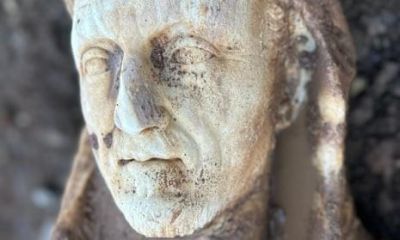An ancient Roman statue of Hercules has been discovered during repairs to the sewerage system underneath a park in Rome. The statue, which apparently dates back to the Roman imperial period (27BC to AD476), emerged from the ground around the second mile mark along the ancient Appian Way, a famed historic road. The Appia Antica Park announced on Facebook that the area “has reserved a great surprise for us: a life-size marble statue which, due to the presence of the club and the lion’s coat covering its head, we can certainly identify as a figure representing Hercules”. The discovery was made during repair work on some sewer pipes that had collapsed, causing chasms and landslides. The excavations reached a depth of about 65 feet and, as often happens in Rome, were carried out with the presence of archaeologists. In November last year an “exceptional” trove of bronze statues, preserved for thousands of years by mud and boiling water, was discovered in a network of baths built by the Etruscans in Tuscany. The 24 partly submerged statues, which date back 2,300 years and have been hailed as the most significant find of their kind in 50 years, include a sleeping ephebe lying next to Hygeia, the goddess of health, who has a snake wrapped around her arm.
Una statua di Ercole è stata scoperta durante la riparazione delle fogne sotto un parco a Roma. Si ipotizza che la statua risale al periodo imperiale (dal 27 aC al 476 dC). La statua fu sepolta al terzo chilometro della via Appia. Il Parco Antico della Via Appia ha annunciato su Facebook di avere trovato un'incredibile sorpresa: una statua in marmo della grandezza di un umano che aveva in mano una mazza con la testa di leone. Senza dubbio, gli operai hanno capito subito che si trattasse di una statua di Ercole. La scoperta è avvenuta mentre alcuni operai stavano lavorando alle condutture fognarie che sono state la causa delle recenti frane sulla Via Appia. Gli escavatori hanno scavato una buca di oltre 20 metri quando hanno trovato la statua. Ogni volta che gli operai devono scavare la terra a Roma, gli archeologi sono sempre presenti. Per fortuna, gli archeologi erano insieme agli operai e hanno potuto aiutare con lo scavo. Nel novembre 2022, è stato uno scavo in Toscana dove gli operai hanno trovato un tesoro di 24 statue in bronzo conservate dal fango e dalle acque termali. Le statue furono costruite dagli Etruschi più di 2.300 anni fa. Queste statue sono i primi reperti di questi tipi di bronzi che siano stati scavati da più di 50 anni. Il tesoro comprende un efebo addormentato che giace accanto a Igea, la dea della salute. L'efebo ha anche un serpente avvolto intorno al braccio.



